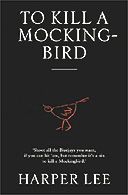It's been years that people have been pressing me to read this book. To Kill A Mockingbird is a classic beyond classics, a story that lives long beyond the era the author wrote it. But do i like it? Hmm. That one bears thinking.
The story is from the perspective of Jean 'Scout' Louise Finch, born to a family of 'background' (one concept prone to mention by her Aunt Alexandra, but one she cannot understand). Harper Lee peppers her main character with such wit, and her opinions are with such alacrity, it is at once impossible to imagine such an insightful eight-year old, and at the same time entirely acceptable (my, what quick kids they breed in the Deep South, you hear yourself mumble).
Her father, Atticus Finch, brings along a load of trouble when he takes on the case of Tom Robinson - a negroe who is brought to court on the charge or raping a white girl. While the case is certainly the main core of the narrative, Harper Lee weaves in two subplots (or more, but i can only think of two) and these do not help in any way the presentation of the story itself. The  first is that of Boo Radley, a neighbour of the Finches that provokes such mystery as he's never seen outside. Ever. Naturally kids get curious and go poking about his property - Jem (Scout's brother) and Dill, a friend who comes over every summer, thinks of tiresome ways to find out how Boo Radley looks like. The second is that of old Mrs Henry Lafeyette Dubose, a monster of a spinster. Jem and Scout are forced to read to her after Jem wrecks her garden in a fit of rage, and it turns out they helped her overcome her morphine addiction, although a woman like that doesn't earn much sympathy with all the 'Nigger-lover!' yelling she does.
first is that of Boo Radley, a neighbour of the Finches that provokes such mystery as he's never seen outside. Ever. Naturally kids get curious and go poking about his property - Jem (Scout's brother) and Dill, a friend who comes over every summer, thinks of tiresome ways to find out how Boo Radley looks like. The second is that of old Mrs Henry Lafeyette Dubose, a monster of a spinster. Jem and Scout are forced to read to her after Jem wrecks her garden in a fit of rage, and it turns out they helped her overcome her morphine addiction, although a woman like that doesn't earn much sympathy with all the 'Nigger-lover!' yelling she does.
I guess the only reason Harper Lee put those subplots in was to pound in the message 'look at it from the other man's point of view!' again and again. It stays throughout the climax at the courthouse and the extremely long-winded conclusion, where Lee, thinking it isn't enough, takes the time to pound it between our ears again. And in the end my impression of the novel is diluted.
It is funny, laugh-out-loud so. It is startling in its moments of genius, where the author's wisdom seeps through.
After Atticus unwittingly reveals himself to be have one time been the deadest shot in Maycomb by sniping the head off a mad dog, Scout asks Miss Maudie why he never revealed it to them:The tension builds up and it'll make you scream in outrage at the unfairness of it all, of how they believe in democracy, yet descriminate against certain classes. But in my list, it wouldn't be at the very top. I reserve that for Lord Of The Flies, awe-inducing in its conception.
"Maybe if i can tell you," said Miss Maudie, "If your father's anything, he's civilised at heart. Marksmanship's a gift of God, a talent - oh, you have to practise to make it perfect, but shootin's different from playing the piano or the like. I think maybe he put his gun down when he realized God had given him an unfair advantage over most living things. I guess he decided he wouldn't shoot till he had to, and he had to today.
"Look's like he'd be proud of it," i said.
"People in their right minds never take pride in their talents." said Ms Maudie.
It won the Pulitzer Prize. Libraians, better read people than me, i should say, think it is The Book Everyone Must Read Before They Die. Is it? You read it to find out.



2 comments:
i know in the US, 13 year old reads this book in their literature class
Wow. That's deep. Wonder whether they understand half of what they're reading - and what did we get? Stripped down Robinson Crusoe.
:P
Post a Comment